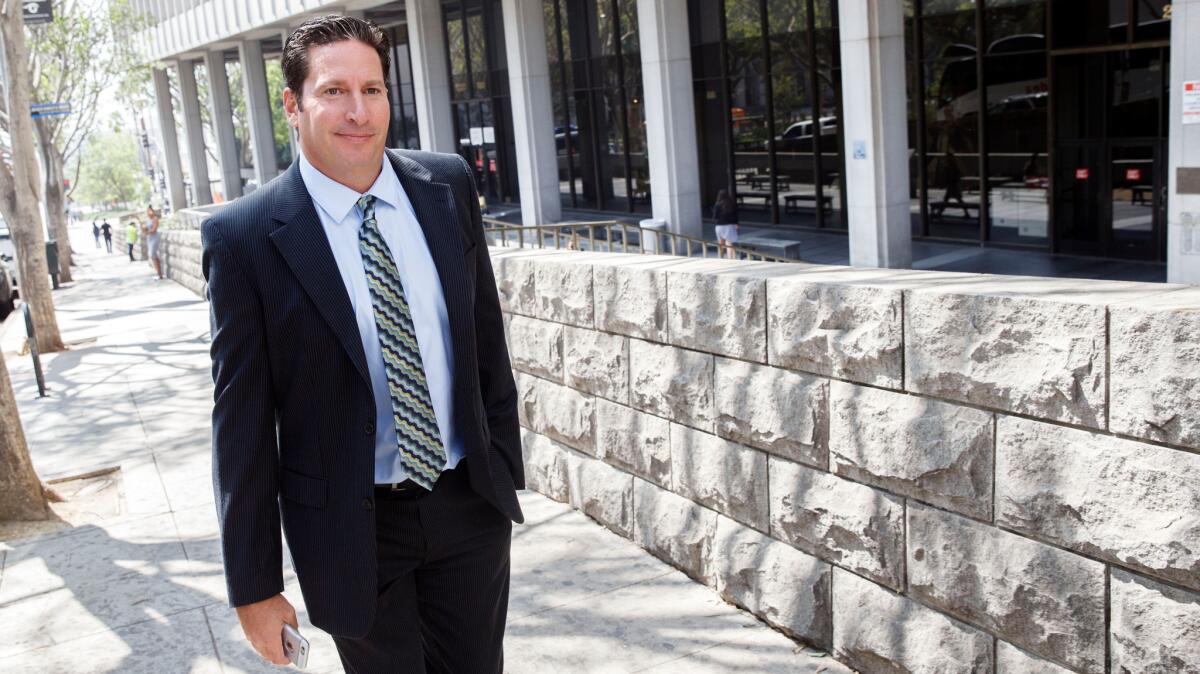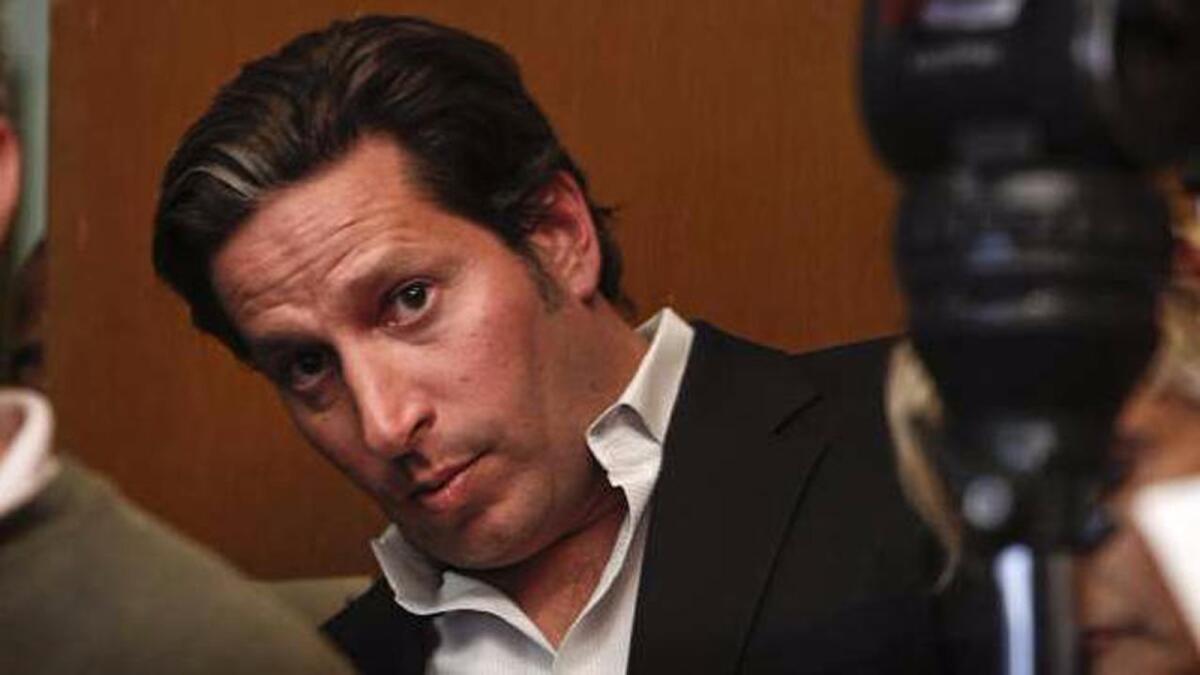Sentencing in corruption case delayed for ex-L.A. Coliseum manager, a onetime rising star

- Share via
Six years ago, Todd DeStefano was an up-and-coming executive for the Los Angeles Memorial Coliseum, the storied stadium built to honor the veterans of World War I that has hosted two Summer Olympics.
It was a gig that promised glamour — if he and his boss were somehow able to lure the NFL back to Los Angeles.
But instead of celebrating the return of the Rams, the disgraced ex-manager, now 43, is facing six months in jail after pleading no contest to one felony conflict-of-interest count in what prosecutors have described as a wide-ranging corruption scandal. He has also agreed to pay $500,000 in restitution to the county.
DeStefano appeared in court Tuesday, and a judge delayed his sentencing for Sept. 6 so the court can receive a report from the county Probation Department.
The case also implicated one of the nation’s best-known leaders in electronic dance music festivals, Insomniac founder Pasquale Rotella, 41, and forced the company’s signature Electric Daisy Carnival out of Los Angeles and into Las Vegas. Rave fans have stood by Rotella, whom one rave fan website called the musical genre’s “fearless leader,” and who still runs Insomniac as a subsidiary of Live Nation, the concert giant.
At the heart of the controversy has been an ongoing battle to legitimize raves from their days as Ecstasy-fueled parties held in warehouses or the desert and allow them to be held in mainstream venues as marathon dance festivals. The events are big business — in federal filings, Live Nation has trumpeted Electric Daisy Carnival as a successful revenue maker.
Los Angeles County prosecutors, however, outlined business practices pursued by rave companies that they said was illegal, came at the expense of public health and safety, and defrauded taxpayers of millions of dollars.
In an indictment handed up four years ago, DeStefano was accused of playing a key role in a bribery and embezzlement scheme in which more than $2 million was siphoned away from the taxpayers who own the Coliseum and into his pockets or a side company he controlled.
See the most-read stories this hour >>
The lion’s share of the stolen money — $1.89 million — came from Rotella’s company and another firm, according to court records. The raves staged by those companies at the Coliseum property came under fire after the Ecstasy overdose death of a 15-year-old girl, Sasha Rodriguez, who attended the Electric Daisy Carnival at the stadium in 2010.
Prosecutors called DeStefano an “inside man” for the rave companies, alleging that he “argued strenuously” for rent discounts and saved them “significant sums of money” in exchange for the payments.
DeStefano, prosecutors alleged, was a “mole” who provided rave promoters with inside information as they sought to persuade Coliseum commissioners to keep raves at the venue after Sasha’s death.
Prosecutors also accused DeStefano of embezzling at least $240,000 by tricking companies to make payments to his own “cleverly named company, ‘Los Angeles Coliseum Events,’” instead of to the government agency that managed the venue.

DeStefano was accused of directing companies such as Coca-Cola and DreamWorks into making checks payable to his personal company instead of to the Coliseum, court records said.
The payments to DeStefano, and the existence of his side company, remained a secret to the public until The Times in early 2011 began publishing stories detailing the former events manager’s ties to the rave companies and other financial irregularities.
In an interview with The Times, DeStefano acknowledged simultaneously working for both the Coliseum and Rotella’s company, but at the time declared “there was no conflict of interest” and said he had done nothing wrong.
DeStefano’s attorney, Richard G. Hirsch, said outside court Tuesday that he believed the case was “blown way out of proportion,” and that the money his client earned did not belong to the Coliseum.
“Both sides gave up something in reaching a settlement,” Hirsch said. “We feel to a certain extent that the settlement is fair. Mr. DeStefano wants to move on with his life and become a productive member of society again.”
If he had gone to trial as expected this month, DeStefano could have faced 10 years in prison if convicted on all charges. Prosecutors, however, decided to settle the case after Los Angeles County Superior Court Judge Kathleen Kennedy rebuked the Los Angeles County district attorney’s office for repeatedly mishandling evidence.
The two men in charge of the rave companies, Rotella and Reza Gerami of Go Ventures, also negotiated plea bargains with prosecutors. Both men could have faced six or seven years in prison; instead, they each pleaded no contest to a single misdemeanor count of conflict of interest and will receive no jail time. Rotella agreed to pay $150,000 to the county and Gerami $30,000; both were placed on probation.
In all, prosecutors said the total loss to the Coliseum from alleged crimes totaled more than $2.5 million, according to court records. The district attorney’s office noted that the defendants had agreed to pay more than $1 million to county taxpayers.
“The resolution of this case resulted in the defendants being appropriately held accountable for their actions,” Dist. Atty. Jackie Lacey said in a statement earlier this month.
But Sasha’s mother, Grace Rodriguez, said in an interview that she was disappointed in the no-jail deals for the rave promoters.
“They all knew what was going on, and they arranged it hush-hush,” Rodriguez said. “I believe all of them should have gotten jail time.”
She said she believed the defendants knew that rave attendees use drugs and that some will die of overdoses.
”They know exactly what goes on in there … They go on with their business knowing that each year, someone is going to pass,” Rodriguez said.
According to interviews and a Times review of coroner records, there have been at least 25 confirmed drug-related deaths nationwide since 2006 among people who went to raves organized by three Los Angeles area companies: Go Ventures, as well as two firms that have become subsidiaries of Live Nation, Insomniac and Hard. Twelve have died in Southern California — four in San Bernardino County and eight in Los Angeles County — and six in the Las Vegas area.
Rodriguez said she believes authorities should ban raves and venues should stop hosting them, saying she understands the pain that parents feel when a child dies of a drug overdose after attending one of the events.
“Every time I read it, it’s heartbreaking to me,” she said. “And I feel so bad for them, because I know it could have been prevented.”
This month’s pleas leave only two defendants still facing charges in the case. Former Coliseum technology manager Leopold Caudillo Jr. is expected to go to trial, with his next court date on Nov. 18. A former stadium janitorial contractor, Tony Estrada, is a fugitive.
Patrick Lynch, the former Coliseum general manager, pleaded guilty to criminal conflict of interest in 2012 and received three years’ probation. He agreed to repay the county $385,000 — the amount he was accused of receiving in kickbacks from Estrada.
Twitter: @ronlin
Para leer esta historia en español, haga clic aquí
ALSO
Preservationists galled after L.A. church building’s stained-glass windows disappear
Angels’ stadium negotiations with Anaheim off to a rocky start
UPDATES:
1:30 p.m.: This article was updated with comments from DeStefano’s attorney.
10:50 a.m.: This article was updated with information that Todd DeStefano’s sentencing was delayed until Sept. 6.
This article was originally published at 4 a.m.
More to Read
Sign up for Essential California
The most important California stories and recommendations in your inbox every morning.
You may occasionally receive promotional content from the Los Angeles Times.










